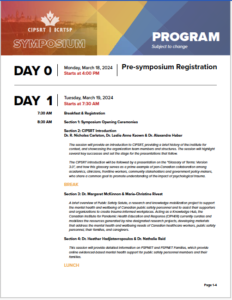News & Events
February 7, 2024
March 2024 SYMPOSIUM
Thank you to everyone who participated in the 2024 CIPSRT Symposium last month.
The event was invigorating, thought-provoking, and packed with information that sparked important conversations we hope will support meaningful impacts across Canada. We were inspired to see and interact with so many people dedicated to supporting the mental health and wellbeing of public safety personnel (PSP).
We were pleased to see many frontline PSP, their leaders, and their family members, as well as leaders in public safety, public officials, policy makers, stakeholders, and changemakers, all gathering alongside academics, researchers, and clinicians. We are thankful for your attendance and contributions to this large-scale knowledge sharing event.
You collectively showed that together we are stronger.
We’re excited to build on the Symposium momentum as we work towards the inaugural CIPSRT 2025 Conference, ‘Thriving in Public Safety: Research to Action‘ in Regina, SK from May 6-8, 2025. Please remember to Save the Date and watch for details to be released as they become available!
Together We Are Stronger: Showcasing Collaborative Efforts to Support the Wellbeing of all Public Safety Personnel (PSP)
Registration is Closed!
March 19–20, 2024 | Ottawa, ON
About:
The Canadian Institute for Public Safety Research and Treatment (CIPSRT) is hosting a 2-day symposium/showcase that is intended to raise a greater awareness among PSP about mental health and wellbeing along with some of the ways that the issue can be addressed. Specifically, the symposium will showcase the combined efforts of CIPSRT and its Public Safety Steering Committee (PSSC) and the research and initiatives that might be helpful.
The symposium/showcase will include highlights of the research outcomes and related national efforts in support of PSP mental health and wellbeing presented by PSP alongside invited national consortium researchers and other CIPSRT network members. Through these collaborative efforts, we hope to rapidly disseminate reliable solutions and enhance the wellbeing of PSP, their leaders, and their families.
Conference Program
subject to change
Monday, March 18, 2024
Starts at–4:00 PM
Pre-conference Registration
Tuesday, March 19, 2024
7:30 – 8:30 AM | Breakfast & Registration
8:30 – 9:30 AM | Section 1: Symposium Opening Ceremonies
9:30 – 10:30 AM | Section 2: CIPSRT Introduction
Dr. R. Nicholas Carleton, Dr. Leslie Anne Keown & Dr. Alexandra Heber
The session will provide an introduction to CIPSRT, providing a brief history of the institute for context, and showcasing the organization team members and structures. The session will highlight several key successes and set the stage for the presentations that follow.
The CIPSRT introduction will be followed by a presentation on the “Glossary of Terms: Version 3.0”, and how this glossary serves as a prime example of pan-Canadian collaboration among academics, clinicians, frontline workers, community stakeholders and government policy-makers, who share a common goal to promote understanding of the impact of psychological trauma.
10:30 – 11:00 AM | Break
11:00 – 11:45 AM | Section 3:
Dr. Margaret McKinnon & Marie-Christine Rivest
A brief overview of Public Safety Salute, a research and knowledge mobilization project to support the mental health and wellbeing of Canadian public safety personnel and to assist their supporters and organizations to create trauma-informed workplaces. Acting as a Knowledge Hub, the Canadian Institute for Pandemic Health Education and Response (CIPHER) currently curates and mobilizes the resources generated by nine designated research projects, developing materials that address the mental health and wellbeing needs of Canadian healthcare workers, public safety personnel, their families, and caregivers.
11:45 – 12:30 PM | Section 4:
Dr. Heather Hadjistavropoulos & Dr. Nathalie Reid
This session will provide detailed information on PSPNET and PSPNET Families, which provide online evidenced-based mental health support for public safety personnel members and their families.
12:30 – 1:45 PM | Lunch
1:45 – 3:00 PM | Section 5:
- Corrections – Dr. Rosemary Ricciardelli & Officer James Bloomfield
Drawing on longitudinal qualitative data, this presentation speaks to how correctional officers describe their experiences of morally injurious behaviors and how these interpretations are deeply rooted in changing understandings of how the public perceive correctional officers. - Families – Dr. Heidi Cramm & Chief Bruce Krauter
Public safety personnel families are important to recruitment and retention. We will outline supports and resources for public safety personnel families, the Garnet Families Network for public safety personnel families and those who support them, and progress in supporting public safety personnel organizations and associations in advancing families-forward policy and programming. - Skills Training – Dr. Andrée-Ann Deschênes & Dr. Gregory Krätzig
Following the identification of the psychological support needs of police officers, what does the police manager need to know? This presentation will address the role, the vulnerable moments in a police career, and training of police managers.
3:00 – 3:15 PM | Break
3:15 – 4:15 PM | Section 6:
- Fire – Dr. Joy MacDermid & Chief Ken McMullen
A brief overview of the UNALARM model that links: heart disease, mental health and cancer risks and health outcomes related to firefighting; implications for health screening and interventions; and current FIREWELL research studies addressing these concerns. - Suicide — Dr. Simon Hatcher & Sarah McEwen
A brief review of suicide prevention in public safety personnel with an emphasis on the role of families.
4:15 – 4:30 PM | Closing Remarks
5:00 PM | Reception
Wednesday, March 20, 2024
8:00 | Breakfast
9:00 – 9:30 | Section 7: Welcome
9:30 – 11:00 | Section 8:
- Police – Dr. Kyle Handley & Sergeant Casey Ward
An overview of contemporary work with police officer mental health, with discussions concerning challenges and successes, identifying gaps, and highlighting effective actions that can occur. - Clinical Emerging Insights – Dr. Megan McElheran & Dr. Kelly Schwartz
Operational stress and posttraumatic stress injuries that impact public safety personnel and their families demand evidence-informed programs delivered by mental health professionals that proactively address negative psychological and social impacts and build resilience. Bringing together the rigour of empirical validation with the expertise of trauma-trained clinical practice, this presentation will share about Canada-wide efforts to advocate for and deliver available and accessible mental health supports for public safety personnel and their families. - Paramedics – Dr. Renée MacPhee
An overview of contemporary work with paramedic mental health and occupational stressors, with discussions concerning challenges and successes, identifying gaps, and highlighting effective actions that can occur. - Peer Support – Dr. Sandra Moll and Chief John Heffernan
Update on current research related to peer support, with a focus on implementation of PeerOnCall, a new mobile health app designed by and for public safety personnel. Key learning will be presented from research in over 34 public safety personnel organizations across Canada.
11: 00 – 11:15 | Break
11:15 – 12:30 | Section 9:
- Innovative Approaches – Karen Prokopec
An overview of the leading-edge work being done with the Ontario Mental Health Secretariat in support of public safety personnel mental health, showcasing challenges and successes, and providing pathways for similar solutions across Canada.
- RCMP Study/Extension – Dr. R. Nicholas Carleton
Presents a brief overview of the RCMP Study and the Extension of the RCMP Study to other public safety personnel sectors, including the most current results and how those can help inform mental health improvements for everyone.
12:30 – 13:30 | Lunch
13:00 – 14:00 | Section 10: Panel Discussion
This panel discussion will synthesize the symposium presentations and experiences, identifying key opportunities and challenges, and providing broad take-home themes for all attendees.
14:00 – 14:30 | Section 11: Moving Forward
The final session will present the broad vision for CIPSRT going forward during the next five years, highlighting initial short- and long-term goals, and underscoring a commitment for inclusive engagement and tangible outcomes for public safety personnel, their leaders, and their families.
14:30 | CONCLUSION OF SYMPOSIUM
Who Should Attend?
Public safety personnel (PSP), PSP leaders, and PSP stakeholders
PSP includes border services officers, serving Canadian Armed Forces members and Veterans, correctional service and parole officers, firefighters (career and volunteer), Indigenous emergency managers, operational intelligence personnel, paramedics, police officers, public safety communicators (e.g. 911 dispatchers), and search and rescue personnel.
Featured Speakers
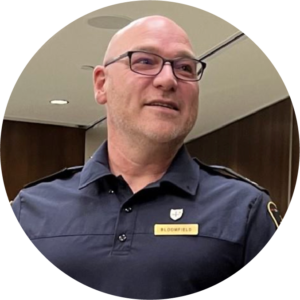
Officer James Bloomfield
Federal Corrections Officer, Prairies Regional President for the Union of Canadian Correctional Officers, National Return to Work Representative UCCO-SACC-CSN, National Mental Health representative UCCO-SACC-CSN, National Health and Safety representative UCCO-SACC-CSN, Canadian Institute for Public Safety Research and Treatment member, Public Safety Steering Committee member.

Dr. R. Nicholas Carleton
Professor of Clinical Psychology, a registered clinical psychologist in Saskatchewan, and is currently serving as the Scientific Director for the Canadian Institute for Public Safety Research and Treatment. He has published more than 240 peer-reviewed articles and book chapters exploring the fundamental bases of anxiety and related disorders. He has completed more than 500 national and international conference presentations. He also serves as an active member of several national and international professional associations. As principal or co-principal investigator he has been awarded more than $72M in competitive external funding. He has received several prestigious awards and recognitions, including induction to the Royal Society of Canada’s College, and as a Fellow of the Canadian Academy of Health Sciences, and was awarded the 2023 Saskatchewan Health Research Foundation Mid-Career Award, as well as the 2020 Royal-Mach-Gaensslen Prize for Mental Health Research. He currently serves as principal investigator on the RCMP Longitudinal PTSD Study (www.rcmpstudy.ca), the associated extension study for Saskatchewan public safety personnel (www.saskptsistudy.ca), and co-principal investigator on the Federal Internet Cognitive Behavioral Therapy Program for public safety personnel (www.PSPSNET.ca).

Dr. Heidi Cramm
Professor, School of Rehabilitation Therapy, Queen’s University and a registered occupational therapist. She is the research lead for the interdisciplinary Families Matter Research Group, working in tandem with its Garnet Families Network. Through mutually informing research and community engagement activities, Dr. Cramm has created a research ecosystem for defence and public safety families and those who study, serve, and support them. She has published more than 130 peer-reviewed articles and publications primarily dedicated to the mental health and wellbeing of defence and public safety families. She has completed more than 300 regional, national, and international presentations and received over $8M in competitive research funding as a Principal or Co-Principal Investigator. Dr. Cramm has been recognized with multiple distinguished research and leadership awards, including the 2018 Canadian Association of Occupational Therapists’ Leadership Award and the 2021 Mihran and Mary Basmajian Award for Excellence in Health Science Research. She is also the Co-Principal Investigator for PSPNET Families (pspnetfamilies.ca), an online wellbeing hub for public safety families.

Dr. Andrée-Ann Deschênes
Doctor in work psychology Andrée-Ann is a professor at the School of Management of the University of Quebec at Trois-Rivières. She teaches public security management programs for managers of today and tomorrow. She is co-holder of the UQTR-ENPQ Research Chair on Prevention in Psychological Health at Work in Public Security. Also, Andrée-Ann is a regular researcher at the International Center for Comparative Criminology. Her subsidized research, disseminated nationally and internationally, concerns the psychology of management in public security organizations, particularly the prevention of psychological health at work in the police environment.

Dr. Heather Hadjistavropoulos
Professor of Psychology at the University of Regina, and a global expert on optimizing Internet-delivered Cognitive Behaviour Therapy (ICBT). She is founder and Executive Director of the Online Therapy Unit, which has been delivering and researching ICBT for Saskatchewan residents since 2010. She is also Principal Investigator and Director of the Public Safety Personnel Internet-delivered Cognitive Behaviour Therapy (PSPNET) program responsible for implementing and evaluating ICBT for Canadian public safety personnel. Dr. Hadjistavropoulos’ innovative research has leveraged $33M in funding and she has published over 200 peer-reviewed publications. Dr. Hadjistavropoulos is a Fellow of the Canadian Association of Cognitive Behavioural Therapies and the Canadian Psychological Association. While running digital mental health services, she maintains her commitment to research, education, collaboration and consultation that is serving to strengthen digital mental health care in Canada.

Dr. Kyle Handley, CPsyc
Dr. Kyle Handley is the Senior Director of Wellness for the York Regional Police (YRP) and the chair of the Canadian Association of Chiefs of Police – Psychological Services Committee. Dr. Handley has used his training in both clinical psychology and organizational development to support his work with police services, hospitals, universities, and private corporations in the United States and Canada. Currently, Dr. Handley is responsible for the design and delivery of YRP’s comprehensive wellness strategy, management of the biopsychosocial spiritual wellness team, and providing general mental health education and support for YRP members and their families. Dr. Handley was also recently selected to serve on the Committee on Global Affairs through the International Association of Chiefs of Police – Police Psychological Services Section.

Dr. Simon Hatcher
Professor of Psychiatry at The University of Ottawa, Canada. He moved to Ottawa from the Department of Psychological Medicine in Auckland, New Zealand in May 2012. His main research interests include suicide, self-harm, psychotherapies, clinical trials, medically unexplained symptoms, first responder’s mental health, trauma informed care in the homeless and e-therapies. The OHRI research lab he heads, Hatching Ideas (https://hatchingideaslab.com/) focuses on clinical trials in underserved populations such as suicidal men, the homeless, people with long COVID and first responders. Clinically he works in the downtown homeless shelters in Ottawa and the Liaison Psychiatry service at The Ottawa General Hospital where he also runs a First Responder Mental Health Clinic. He is the chair of the suicide prevention committee of CIPSRT and the lead in a project to develop a suicide prevention strategy for public service personnel in Canada. His brother-in-law is a paramedic in Montreal.

LCol (ret’d) Dr Alexandra Heber MD FRCPC
Dr. Heber is Chief of Psychiatry for Veterans Affairs Canada (VAC), and Associate Professor, Department of Psychiatry and Behavioral Neurosciences at McMaster University. She has 40 years’ experience in mental health as a nurse and a psychiatrist. After a decade at University of Toronto working with HIV+ clients and leading an ACT Team, she enrolled in the Canadian Armed Forces (CAF) and deployed to Afghanistan in 2009. In 2016, she became inaugural Chief Psychiatrist for VAC, and their Lead Author on the CAF-VAC Joint Suicide Prevention Strategy.
In 2019, she served on the Ontario Chief Coroner’s Expert Panel on Police Officer Deaths by Suicide, and worked with the Public Health Agency of Canada to develop the Federal Framework on PTSD. In March 2020, she led a Task Force for the Canadian Institute for Public Safety Research and Treatment, creating resilience supports for first-responders during the pandemic, the COVID-19 Readiness Resource Project (CRRP). In 2022, she appeared as an expert witness for the Mass Casualty Commission investigating the 2020 shooting rampage in Portapique, Nova Scotia. In 2022, she led creation of a Knowledge Hub, the Canadian Institute for Pandemic Health Education and Response (CIPHER), a federally-funded project to mobilize mental health resources for workers affected by COVID-19. Dr Heber has published and presented nationally and internationally on trauma and mental health in Military, Veteran, and Public Safety Personnel. She co-chairs the Canadian Military Sexual Trauma Community of Practice, and she is Lead Author on the Glossary of Terms 3.0.
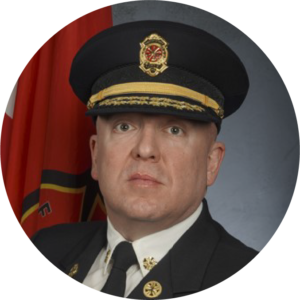
Chief John A.T. Heffernan, MMM, CD, ECFO
John has been a long-time advocate for the mental health of First Responders, members and Veterans of the Canadian Armed Forces and their families. In January 2020, representing the Canadian Association of Fire Chiefs (CAFC), John attended the initial Design Sprint for the PeerOnCall App at the MaRS Discovery District in Toronto, ON and now sits on the National Advisory Team for this project.
John has been active in the fire service for over 34 years and is currently the Fire Chief of the Conception Bay South Fire Department in Newfoundland and Labrador. Concurrently, with over 35 years of service to the Canadian Armed Forces, John was appointed Brigade Sergeant Major for 37 Canadian Brigade Group in Moncton, New Brunswick – the Command Formation of all Army Reserve soldiers in both Newfoundland and Labrador & New Brunswick.
Additionally, John accepted a voluntary position with Wounded Warriors Canada in 2013 as the Provincial Ambassador for Newfoundland and Labrador. In this role, his focus is on finding solutions through a wide range of programs and services where gaps have left Canada’s ill and injured Veterans, First Responders, and their families in need.
John was invested in the Order of Military Merit in Ottawa in 2016 and holds the designation of Executive Chief Fire Officer (ECFO) from the Canadian Association of Fire Chiefs where he also sits as Co-Chair of the Firefighter Mental Health Committee.
John lives in Topsail, Newfoundland with his wife, Gordina and their Border Collie, Freeman.

Dr. Gregory Krätzig
In his position as Director of Research and Strategic Partnerships at Depot Division, the RCMP’s Training Academy in Regina, Dr. Krätzig designed and developed a comprehensive research program and a sophisticated simulation lab that attracts interest from academic researchers and police agencies nationally and internationally. The simulated firearms research he developed has been adopted by the US Federal Law Enforcement Training Centre (which handles 70,000 trainees annually) and by the police force in Singapore. Gregory Krätzig has earned an international reputation for cutting edge research that is helping first responders worldwide prepare better for volatile and dangerous situations.

Chief (ret’d) Bruce Krauter
Chief Krauter began his career in Paramedicine in 1983, progressed up through the ranks, and was appointed Chief of Essex-Windsor EMS in July 2014. He lead a service with 300+ staff and responded to over 60,00 calls per year.
Chief Krauter was an active member of National and Provincial Paramedic Chief organizations, as well as various other community groups and committees. Bruce is a recent recipient of the Queen Elizabeth II Platinum Jubilee Pin and the EMS Exemplary Service Medal, with the distinction of receiving the 40-year bars from the Governor General of Canada.
Chief Krauter, in partnership with Wounded Warriors Canada and the Paramedic Chiefs of Canada, developed the “Slip-On Your Red” campaign. Through Red Epaulettes, this campaign recognizes and supports the mental wellness of our soldiers, veterans, first responders, and their families across Canada, Ontario, and our local community.
Krauter was key in developing WEHelpfirst.ca, a collaborative mental wellness program, involving Police, Fire, Academics, and Hospitals together.
As Krauter came up the ranks, he understands the profound impact that difficult calls can have on first responders and their families and openly addresses and highlights the mental wellness challenges faced. He was honored with the Carol Mueller Mental Health Champion Award and has become an Ambassador for both CMHA’s Sole Focus Project and Wounded Warriors Canada.
Throughout his career, Chief Krauter’s unwavering commitment to advancing paramedicine, community welfare, and mental health advocacy stands as a testament to his remarkable leadership and dedication.

Dr. Joy MacDermid, BSc, BScPT, MSc, FCAHS, FRSC
Clinical epidemiologist, physiotherapist, a CIHR Sex and Gender champion and Distinguished Professor of Physical Therapy at Western University. She is a Fellow of the Canadian Academy of Health Sciences and The Royal Society of Canada, holds a Canada Research Chair in MSK Health Outcomes and Knowledge Translation, and the Dr. James Roth Chair in Musculoskeletal Measurement and Knowledge Translation.
Dr. MacDermid’s research focuses on firefighter health, musculoskeletal health, upper extremity function, implementation physical and mental health interventions/programs, and the impact of sex and gender on health. She is the Scientific Director of FIREWELL an independent knowledge translation platform and research collaborative.

Dr. Renée MacPhee
Dr. Renée MacPhee has been an integral member in the Canadian paramedic community for 25 years, devoting her time helping as a researcher and educator. She is a tireless advocate dedicated to improving their physical and mental health and wellbeing. MacPhee is the co-inventor of the Ottawa Paramedic Physical Abilities Test (OPPAT) – an evidence-based test designed to assess the physical readiness of paramedics entering, or returning to, the profession. In 2017, she became a Founding Member and Paramedic Sector Lead at the Canadian Institute for Public Safety Research & Treatment (CIPRST). In 2018 her commitment to the health of paramedics across Canada earned her the Paramedic Chiefs of Canada Presidential Award of Excellence, marking the first time that the award has been bestowed upon a civilian. In 2022, she joined the Mental Health Collaborative for Public Safety Personnel with the Ontario Solicitor General’s Office. She co-authored the seed document for the CSA Paramedic Psychological Health and Wellness Standard. In 2022, she was presented with the Laurier University Award for Community Service and Engagement in recognition of her efforts supporting Canadian paramedics. Her determination to identify and implement solutions that address the needs of the paramedic community has earned her the respect and cooperation of paramedic leadership, frontline, and labor groups. Her publication record includes peer- reviewed journals, technical reports, book chapters, and more than 90 presentations. It is her long-held belief that successful research in the field of paramedicine is the result of work that is done by paramedics, with paramedics, for paramedics.

Dr. Megan McElheran, Psy.D.
Dr. Megan McElheran is the CEO and Chief Clinical Psychologist of Wayfound. Dr. McElheran completed graduate training at the PAU-Stanford University Clinical Psychology Consortium, during which she obtained specialized training in the treatment of PTSD through the National Center for PTSD in Menlo Park, CA. Dr. McElheran has been in practice in Calgary since 2008. She continues to focus on work with first responders, and her clinical practice involves work with active-duty members of the Canadian Forces, members of the Royal Canadian Mounted Police, members of the Calgary Firefighter Department, medical personnel, and others who are directly or vicariously impacted by traumatic events. She routinely engages in teaching and supervisory activity to ensure the sound dissemination of empirically-grounded interventions for trauma. Dr. McElheran is regularly engaged in speaking events, both locally and internationally. She completed a TEDx speech in 2011 related to Trauma, Change, and Resilience and most recently completed a discussion for the Healing Project on trauma and PTSD.

Sarah McEwen
Sarah McEwen has dedicated over 16 years to serving as a civilian member of the Ottawa Police Service, contributing her skills across diverse units. Currently, as the Wellness Resource Liaison, Sarah plays a crucial role in bolstering the well-being of Ottawa Police members and their families. Her passion for aiding first responder families stems from her own experiences as the spouse of an Ottawa Police officer, giving her a profound understanding of the challenges they face.
Beyond her primary role, Sarah actively contributes to the community, by supporting foundations and charities such as the Ottawa First Responder Foundation. Her commitment extends to the development of programs and research aimed at enhancing Public Safety Personnel (PSP) support systems. Sarah’s work is characterized by her empathy, dedication, and a deep-seated commitment to making a tangible difference in the lives of first responders and their families.
Her efforts not only highlight her professional expertise but also her personal investment in fostering a supportive environment for those who serve our community. Through her contributions, Sarah McEwen continues to be a beacon of support and advocacy for the wellbeing of PSP members and their loved ones.

Dr. Margaret McKinnon
Dr. Margaret McKinnon serves as the Homewood Research Chair in Mental Health and Trauma and as Professor and Associate Chair, Research in the Department of Psychiatry and Behavioural Neurosciences at McMaster University. She is also the Research Lead in Mental Health and Addictions at St. Joseph’s Healthcare Hamilton and a Senior Scientist at Homewood Research Institute.
Dr. McKinnon completed her PhD in Psychology at the University of Toronto, followed by a post-doctoral fellowship at the Rotman Research Institute at Baycrest Centre. She is an elected Fellow of the Canadian Psychological Association and is dually licensed as a clinical psychologist and neuropsychologist.
Dr. McKinnon is known for her work characterizing trauma-related illness and PTSD. She is also involved in the development and testing of novel treatment interventions aimed at often-unexplored aspects of PTSD and trauma.
Dr. McKinnon serves as the Chair of the federally funded PTSD Centre of Excellence’s Research Reference group. She also serves as Director on numerous community boards and as an advisory board member for several Canadian research centres. She has published more than 180 peer-reviewed papers and chapters.
Dr. McKinnon currently holds funding from the Canadian Institutes of Health Research, the Canadian Institute for Military and Veteran Health Research, Defence Canada, Veteran’s Affairs Canada, the Chronic Pain Centre of Excellence for Canadian Veterans, the PTSD Centre of Excellence, and the Workers Safety Insurance Board of Ontario. She also holds funding from numerous private foundations, including True Patriot Love, the Cowan Foundation, and the Military Casualty Support Foundation.
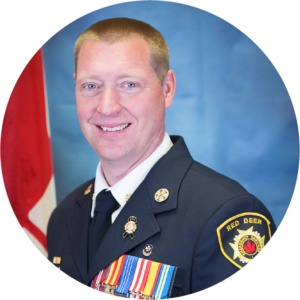
Chief Ken McMullen
Chief Ken McMullen joined the Fire Service in 1997 as a Volunteer Fire Fighter and progressed through the Officer roles of Training, Fire Prevention and Fire Safety, as well as a certified Fire Investigator/Inspector. In 2009, Ken became the Assistant Deputy Chief with the Calgary Fire Department, and in 2018, Ken became the Chief of Emergency Services with The City of Red Deer. As the third largest municipality in Alberta, Red Deer Emergency Services is one of the few remaining fully integrated services comprising of 230 staff of Fire Fighter Paramedics, Dispatchers, Fire Prevention Officers, and Administration.
Ken is also a member of CANADA Task Force 2 and during his tenure he has been deployed to the Slave Lake Fire in 2010, the Calgary Floods in 2013, and as the Task Force Commander to the Wild Fires in Fort McMurray in 2016, the Yukon Floods of 2021, and most recently the Wild Fires of 2023.
Ken is the President of the Canadian Association of Fire Chiefs and holds board positions with the International Association of Fire Chiefs where he continues to collaborate on legislative changes and advocacy initiatives that pertain to the Fire Service. In 2020, Ken was awarded Career Fire Chief of the Year for his unrelenting advocacy work on mental health support for first responders, and recently awarded the President’s Award from the International Association of Fire Chiefs for his dedication to the fire service and the wellbeing of first responders.

Dr. Sandra Moll
Dr. Sandra Moll is the principal investigator for the CIHR research team and primary developer of the PeerOnCall app platform. Dr. Moll is an Occupational Therapist and Associate Professor in the School of Rehabilitation Science at McMaster University. Her clinical and research expertise is in the area of mental health, building on over a decade of frontline clinical work and over two decades of applied research. Her primary program of research focuses on workplace mental health, along the continuum from mental health promotion to intervention and return to work. Her methodological expertise is in participatory co-design and implementation science.

Chief Pierre Poirier
Since 2020, Pierre has served as the Chief of the Ottawa Paramedic Service, leading an organization that responds to almost 200,000 calls for service. Prior, he was the Manager of Security and Emergency Management for the City of Ottawa, where he provided stewardship in the management of several incident including a pandemic, two floods, a tornado, a train-bus incident, and a sinkhole in the downtown core.
Pierre has been an Advanced Care Paramedic for more than 30 years. Pierre has a master’s certificate in Municipal Leadership from York University, a certificate in Health Management from the University of Saskatchewan, a Bachelor of Arts degree from the University of Manitoba and a Master’s in Business Administration from the University of Alberta.
Pierre has been working with the Paramedic Association of Canada for several years. He has led the development of several standards with the Canadian Standards Association (CSA Group) including First responder fatigue risk management, Work disability management for paramedics, Paramedic response to the opioid crisis, Ergonomic vehicle and equipment design for ambulances, Psychological health and safety in the Paramedic Service Organization, and Community Paramedicine. Currently, he is working on the renewal of the National Competency Framework for Paramedics.
Currently, Pierre is the co-chair of the Public Safety Steering Committee for the Canadian Institute for Public Safety Research and Treatment.

Karen Prokopec
In September 2020, Karen was asked to establish the Mental Health Secretariat. In February 2021, following the release of Staying Visible, Staying Connected for Life, Ontario established four mental health collaborative tables for corrections, emergency health services, fire and police. Karen and her team are working with key partners to advance evidence-based mental health services that focus on PSP wellbeing, resiliency, and early interventions so that the worst outcomes of trauma can be prevented.
In her previous role she served as Manager, Research and Strategic Partnerships in the Ministry and was responsible for leading research on occupation stress injuries. Over the last 30 years, Karen has worked across a variety of ministries and functions in the provincial government.

Dr. Nathalie Reid
Dr. Nathalie Reid is currently the Director of the Child Trauma Research Centre at the University of Regina, and teaches in the Faculty of Education. Her current research interests include trauma-sensitive pedagogies, mental health and connectivity, pre- and post-migration trauma, community arts-based reconnection opportunities for youth, public safety personnel families’ experiences, and climate trauma.
Nathalie obtained her BA (Honours) and her BEd from Queen’s University. She went on to teach English, French, Social Studies, and Drama/Musical Theatre in Ontario, Nova Scotia, and in two communities in Alberta. She obtained her Master’s in Curriculum Development from St. Francis Xavier University where she inquired into narratives of death and dying in school contexts (Fish Tales: A Hermeneutic Narrative Exploration of the Multi-layered Texture of Death). Her doctoral research, Teachers’ Experiences of/with Trauma and Trauma-Sensitivity: A Narrative Inquiry into Trauma Stories and Stories of Trauma sought to foreground the stories of trauma and trauma stories that teachers live by, with, and in. Her research program continues to inquire into the experiences of educators.
Nathalie is married to an incredible husband and has two wonderful sons

Dr. Rosemary Ricciardelli
Dr. Rosemary Ricciardelli is Professor (PhD) in the School of Maritime Studies and Research Chair in Safety, Security, and Wellness, at Memorial University’s Fisheries and Marine Institute. Elected to the Royal Society of Canada, her research centers on evolving understandings of gender, vulnerabilities, risk, and experiences and issues within different facets of the criminal justice system and among mariners. She has published 16 books, 270+ journal articles and 65+ chapters all in the areas of police, firefighting, correctional workers, public safety communicators, and criminalized persons, and wellness – broadly defined. As a sex and gender researcher, her interests lay in the social health, identity construction, and lived experiences of individuals. She leads a longitudinal study on the mental health and wellbeing experiences of correctional officers employed by Correctional Services Canada.

Marie-Christine (MC) Rivest
As a Knowledge Translator at the Canadian Institute for Pandemic Health Education and Response (CIPHER), one of Marie-Christine’s roles is to bridge the gap between complex information derived from research and its practical application. Marie-Christine facilitates the exchange of knowledge among researchers, professionals, healthcare workers, public safety personnel, and the general public. Furthermore, as a Ph.D. candidate, Marie-Christine directs her research toward exploring organizational behaviour and wellbeing among educational leaders.

Dr. Kelly Dean Schwartz
Dr. Kelly Dean Schwartz is a Registered Psychologist (AB) and Associate Professor, School and Applied Child Psychology, in the Werklund School of Education, University of Calgary. His research and teaching interests include the psychosocial factors contributing to child, adolescent, and family development, particularly how ecological systems contribute to both risk and thriving in individual and social contexts. Dr. Schwartz is a full member of the Alberta Children’s Hospital Research Institute (ACHRI), the Owerko Centre, the Mathison Centre for Mental Health Research and Education, the Hotchkiss Brain Institute, the Canadian Institute for Military and Veteran Health Research, and the Canadian Institute of Public Safety Personnel Research and Treatment.
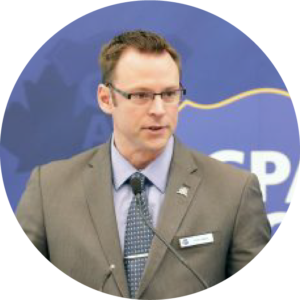
Sgt. Casey Ward
Sergeant Casey Ward works for the Regina Police Service and serves as the president of the Saskatchewan Federation of Police officers. He also serves as a member of the public safety steering committee for the Canadian Institute of Public Safety Research and Treatment. Sergeant Ward has collaborated on several projects aimed at improving the health and wellbeing of public safety personnel.

